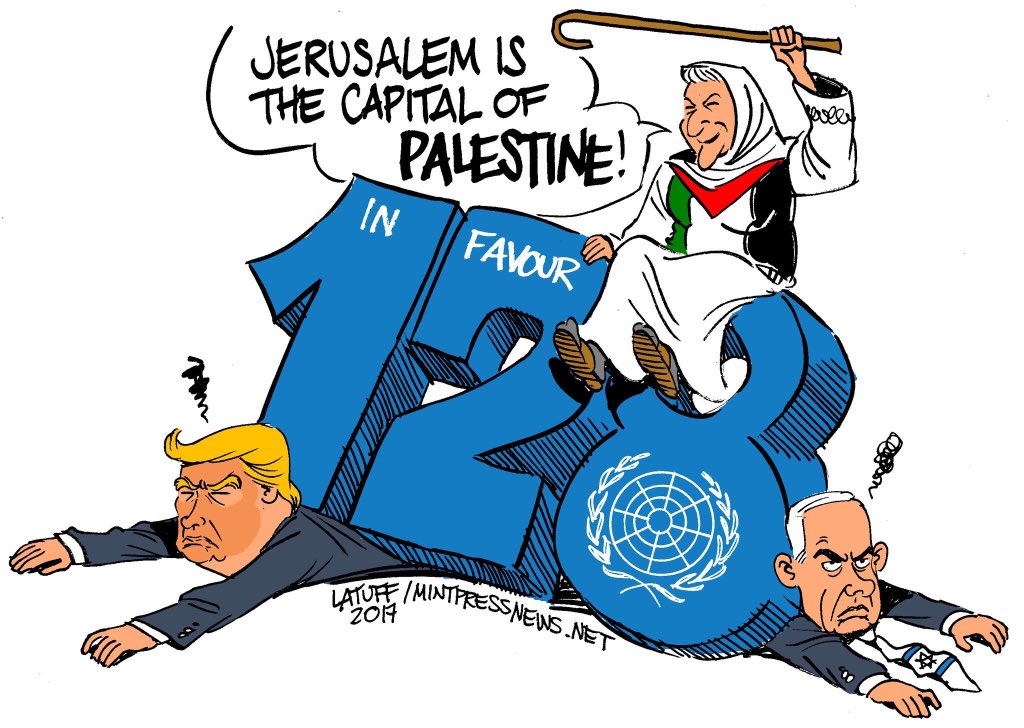Alsof het normaal is een groot aantal landen te chanteren, stelden Trump en Haley, voordat de VN samenkwam om de beslissing van de VS te veroordelen, dat arme landen die hulp krijgen van de VS het wel kunnen vergeten als zij voor deze resolutie zouden stemmen........ Een chantage die bij mijn weten alleen eerder werd (en nog steeds wordt) gedaan door Japan, in haar wil de walvisjacht voort te zetten. Japan gaf arme landen geld als zij tegen een verbod op de (Japanse) walvisjacht stemden.......
Gelukkig had een groot deel van die arme landen in deze lak aan de VS en stemden dus voor de resolutie die de VS opriep de beslissing te herroepen, Jeruzalem als hoofdstad van Israël te erkennen.

Als je de woorden van Trump en Haley leest in het Anti-Media/Creative Commons artikel van James Holbrooks hieronder, slaat de verbazing (ten overvloede) toe: hoe is het mogelijk dat deze leeghoofden nog door ook maar één persoon serieus worden genomen...??!!! Dit nog naast de achterlijke bewering van o.a. deze twee, dat dit goed is in voor de 'vredesbesprekingen' tussen Israël en de Palestijnen...... Het valt me overigens 100% mee, dat ook de meeste EU landen voor deze resolutie stemden, immers meestal stellen deze landen zich blind achter het walgelijke buitenlandbeleid van de VS.
Ongelofelijk!!
The Whole World Basically Just Gave Trump the Middle Finger
December
22, 2017 at 5:53 am
Written
by James
Holbrooks
(ANTIMEDIA) New
York City — The
Trump administration received a concerted middle finger from much of
the rest of the world on Thursday when it learned very publicly that
its longstanding bullying tactics may be losing their
effectiveness. From the New
York Times:
“A
majority of the world’s nations delivered a stinging rebuke to the
United States on Thursday, denouncing its decision to recognize
Jerusalem as Israel’s capital and ignoring President Trump’s
threats to retaliate by cutting aid to countries voting against it.
“In
a collective act of defiance toward Washington, the General Assembly
voted 128 to 9, with 35 abstentions, to demand that the United States
rescind its Dec. 6 declaration on Jerusalem, the contested holy
city.”
The
United Nations resolution, drafted by
Turkey and Yemen, was the second condemning Trump’s decision to
upend decades’ worth of internationally recognized policy on the
hornet’s nest that is the Israeli-Palestinian conflict.
The
first resolution, written by Egypt, went before the fifteen-member
U.N. Security Council on December 18. United States delegate Nikki
Haley vetoed the
draft while all fourteen other member nations voted in favor of it.
It
was Haley, in a letter sent to U.N. member nations on Tuesday, who
fanned the flames of what was already a controversial decision —
which includes moving the
U.S. embassy from Tel Aviv to Jerusalem — on the part of the
Trump administration. She wrote that
the president would be watching Thursday’s vote “carefully” and
that he’d “requested
I report back on those countries who voted against us.”
She echoed the
warning on Wednesday via Twitter, claiming the embassy move was “the
will of the American ppl” and
that the U.S. would be “taking
names” of
those who stand against the decision.
Trump praised Haley’s
effort at a cabinet meeting on Wednesday. This was also when he made
the threat to cut off financial assistance to nations opposing the
will of the United States:
“I
like the message that Nikki sent yesterday at the United Nations, for
all of these nations that take our money and then they vote against
us at the Security Council, or they vote against us potentially at
the assembly. They take hundreds of millions of dollars and even
billions of dollars and then they vote against us, well, we’re
watching those votes. Let ’em vote against us. We’ll save a lot.
We don’t care.”
Following
Thursday’s lopsided vote, a defeated Haley said the
U.S. would “remember
this day” on
which it was “singled
out for attack in the General Assembly.” Continuing,
Haley reiterated her president’s position, saying the
administration wouldn’t forget the affront when it was “called
upon once again to make the world’s largest contribution to the
United Nations.”
But
it was precisely this threatening tone that rubbed so many people the
wrong way in the first place, and some took the opportunity to speak
on the subject once the vote had been tallied.
“The
world is not for sale,” said Venezuela’s
representative to the U.N., Samuel Moncada Acosta, adding that U.S.
threats “imperil
global peace.”
Palestinian
foreign minister Riad Malki produced a comparable
sentiment, stating that
Palestine “will
not be threatened” and
that the Trump administration, with its action regarding Jerusalem,
is “ignoring
the dangerous repercussions of its decision.”
“What
does this decision serve? It serves the Israeli government in
implementing its colonial plans. It serves the powers of extremism.”
Mansour
then highlighted that even stalwart U.S. allies such as Britain and
France voted in
favor of the resolution.
“Does
the United States not wonder why it stands isolated,” he asked,
“and why even its closest allies couldn’t turn a blind eye to
this decision?”
Fittingly,
in his comments, the foreign minister of Turkey — one of the two
drafters of the resolution — used the word that best sums up the
U.S. strategy to get countries to play ball on the vote: bullying.
Calling Trump’s
decision on Jerusalem “an
outrageous assault to all universal values,” Mevlut
Cavusoglu vocalized what many appeared to be thinking.
“This
is bullying,” he
said. “We
will not be intimidated.” Then,
addressing the U.S. directly, he added: “You
can be strong, but this doesn’t make you right.”
Despite
such unified opposition, the Trump administration remains resolute.
Nikki Haley has already rejected the
U.N. vote and said that plans regarding Jerusalem, including moving
the U.S. embassy there, will go forward as scheduled.
